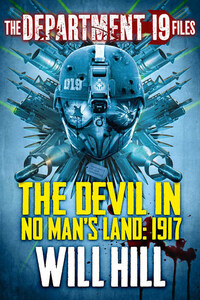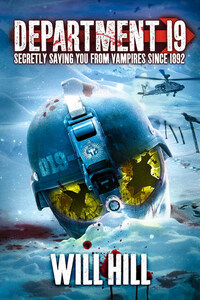In 1891, Abraham Van Helsing and a small number of his friends faced Dracula, the world's first vampire. They chased him across Europe, to the mountains of Transylvania, and the castle that bore his name. Not all of them returned ? but Dracula was destroyed.
Other vampires remained, though, and so in 1892 Van Helsing and the other survivors were asked by Prime Minister William Gladstone to found the Department of Supernatural Investigation.
The Department, which was originally based in a townhouse in Piccadilly, was charged with protecting the British Empire from the growing threat of the supernatural.
Over the course of the twentieth century, the men and women of Department 19, as it became known, fought in every corner of the globe, holding back the rising tide of darkness, often at enormous personal cost.
In a top-secret location, there stands a highly classified archive that records the long history of humanity's war with the supernatural. The papers within it list the names of every man and woman lost in the line of duty, and contain detailed accounts of every act of bravery.
Beyond the men and women of the Department, these are accessible only by the Prime Minister and the Chief of the General Staff.
These are the Department 19 files.
200 YARDS SOUTH-WEST OF PASSCHENDAELE, BELGIUM29th OCTOBER 1917
You never got used to the mud.
It coated everything, turning the entire world a thick, cloying brown. In the Allied trenches it had been churned into a thick, sodden landscape of ankle-twisting ridges and valleys, through which scrabbled rats the size of Jack Russells. Out in the quiet hell of no man's land, in the deep craters and gorges sunk by the artillery shells that had fallen steadily for the last month, it ran like lava, collecting in sucking pools between the shattered trees and the wooden duckboards, wide ladders that had been laid across the blasted earth in the hope that they might provide stable footing.
At night, the darkness made solid ground and treacherous mud indistinguishable. All too often, desperate cries would float on the cold night wind, screams of pure helplessness that were ended either by the merciful crack of a sniper's rifle, or when the relentless mud closed over the poor man's mouth and pulled him down.
Captain Quincey Harker surveyed the darkness through his binoculars. His small unit had advanced maybe fifty yards from the maze of trenches the Allies had dug across the fields of Flanders, a labyrinth of damp timber and mud that stretched from the North Sea to the Swiss border. They were lying flat on the sodden ground, the blackened stump of a fallen oak tree shielding them from enemy eyes. In front of them lay the hundred scorched, shattered yards of no man's land and beyond that, in defensive trenches dug deep and reinforced with concrete, the soldiers of the German Army. Beyond even them, a further half a mile up the gentle incline that thousands had fought and died over, sat Passchendaele, the insignificant farming hamlet that was their destination.
âHow's it look, sir?â a voice whispered.
Harker turned his head. âMuch the same as it always does,â he replied.
On the ground behind him were five men. The nearest, a respectful foot from his right shoulder, was Lieutenant Thorpe. A lifetime ago, he and Quincey had attended school together in Windsor, forging a friendship on the playing fields and in the ancient corridors that had bound them together ever since: to Oxford, Sandhurst, and all the way to this tiny, desolate corner of northern Europe. Behind Thorpe lay the four Privates who made up the rest of Harker's squad.
Potts, their sniper, was only nineteen years old and already wore the look of a man who had seen more death than any one person could be reasonably expected to bear, much of it through the scope of his Lee-Enfield rifle. Ellis, the bespectacled, thoughtful schoolmaster, spoke fluent German and entertained the squad on long patrols with tales of Achilles and Odysseus. He could also speak of home in such eloquent terms that the men would close their eyes and believe, however briefly, that they were far away from the mud and horror of the Western Front. McDonald was a huge, cheerful Scottish highlander, whose red hair and beard provided a splash of vivid colour amid the endless browns and greys of the battlefield. Last was Kavanagh, the latest in a long line of Somerset farmers, with the weathered skin and long, ropy muscles to show for it. Six men, each of whom would have gladly laid down his life for any one of the others.
Officially, however, they didn't exist.
The men were classified, by those with sufficient clearance to even be aware of their existence, as a Special Reconnaissance Unit, under the direct authority of the Chief of the Imperial General Staff.
In October 1914, an emissary from the War Cabinet had intercepted the newly commissioned Second Lieutenant Harker, who was on his way from Sandhurst to join up with his regiment, the Queen's Own Hussars, and informed the young officer that his situation had changed. Following sterling recommendations from the Royal Military Academy, and the intervention of several influential voices in Whitehall, he was instead to be given twelve weeks to select a small squad of men from the thousands awaiting deployment to the front, then make them available for whatever duties the High Command might deem appropriate.














